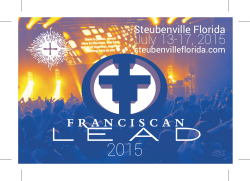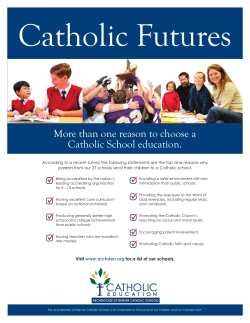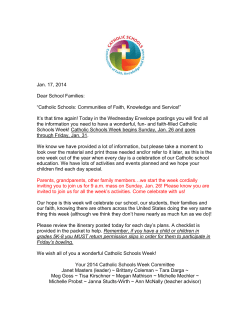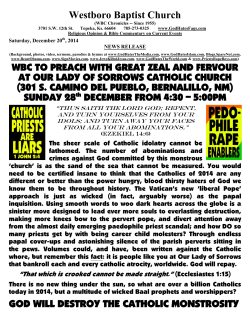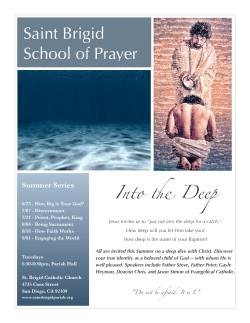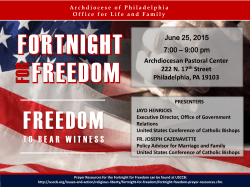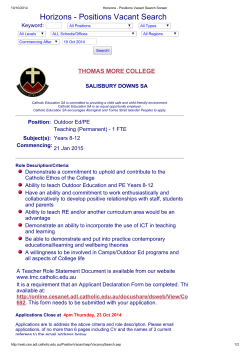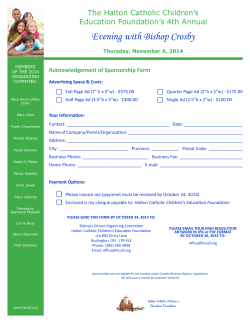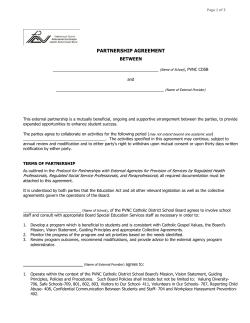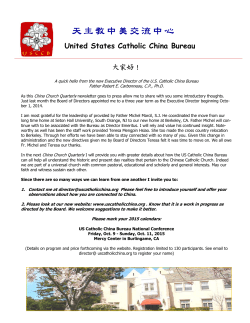
HRE4M - Holy Cross Catholic Academy
2011-12 Revised Holy Cross Catholic Academy Course Information Sheet Course Title: Church and Culture Course Code: HRE4M Prerequisite: None COURSE DESCRIPTION This course is directed toward the clear identification of Catholic ethics and the concrete application of these principles in the lives of students. The course proceeds from foundational beliefs rooted in Philosophy and Revelation. Notions of happiness and freedom are explored. Further issues in social justice, ecology, mercy, marriage, family and politics are addressed. This course is intended to prepare the senior student for the lifelong task of living a good life in dialog with the larger culture. In the Christian Service component, students will have an opportunity to reflect on a portion of the 40 hours of required community involvement. CONNECTION TO OUR CATHOLIC FAITH This course challenges students to understand themselves as moral persons living in a world full of choices. Through an examination of ethical theories, the revelation of Sacred Scripture, and the experience and teaching of the Catholic Church, students will be given an opportunity to explore a variety of moral and ethical issues through the eyes of their Catholic Faith Tradition. Strands SCRIPTURE Overall Expectations PROFESSION OF FAITH Recognize the Scriptures as God’s offer to transform their lives; Demonstrate knowledge of selected narratives and events in Sacred Scripture, and identify their importance for life decisions; Explain how the Scriptures can be used within the Catholic community of faith to analyse and critique contemporary society; Evaluate the various uses of scriptural genres as expressions of God’s activity in the world and the religious use of these genres in Sacred Scripture. Demonstrate an understanding of the relationship between religious faith and contemporary culture; Demonstrate an understanding of the four marks of the Church (one, holy, catholic, apostolic); Explore the idea of culture as found in the teachings of the Church; Demonstrate an understanding of the Catholic Church’s response to contemporary culture as found in the social teachings of the Church; Acknowledge that the call to faith includes a call to justice; Demonstrate an understanding of the Holy Spirit as God’s love alive in the world; Perceive the challenge of how the People of God are called to be a transforming force in relation to contemporary culture; Use an experience of community service work as a lens through which to view the relationship between gospel living and the values of contemporary culture. CHRISTIAN MORAL DEVELOPMENT PRAYER AND SACRAMENTAL LIFE FAMILY LIFE EDUCATION Examine the human search for meaning and purpose in the context of Christian anthropology; Recognize the role of the Church as a community of disciples called to transform the world; Appreciate that humans are created with the ability to discern right from wrong, and with the freedom to choose between them Demonstrate a knowledge of how Catholic Tradition informs moral decisionmaking; Understand that the Ten Commandments arise out of the experience of the Hebrew people and are imperatives in making moral decisions; Examine principles of Catholic moral teaching; Examine key tenets of Catholic social teaching; Explore the Church’s teaching on work; Critique the messages and values of the media which run counter to the Gospel vision of life; Analyse social structures in light of the Church’s social teachings; Explain why people have the right to form labour unions. Identify and describe the role of sacraments in the life journey of Catholics with special emphasis on the sacraments of vocation; Identify the Catholic understanding of the Sacrament of Marriage; Recognize the importance of preparation for marriage, both proximate and longrange; Appreciate the connection between the sacrament of marriage and the scriptural image of marriage as a mirror of God’s love for his people in Christ; Explain and describe the historical and contemporary celebration of marriage within the Catholic Church; Understand the Church’s teachings on valid marriages and annulments; Identify the Catholic understanding of the sacrament of Holy Orders; Define the Christian notion of service to others as a call to ministry; Explain the various forms the call to ministry can take within the Christian community; Demonstrate an understanding of the Church’s historical and contemporary teaching concerning ordained ministry; Explain the various functions of ordained ministers (i.e., Bishop, priest, deacon); Appreciate the challenge to religious vocations as presented by contemporary culture; Examine contemporary approaches to ministry as a call to service. Examine the meaning and value of human freedom and commitment, values and conscience and personal and social responsibility in light of the Catholic faith tradition; Describe and analyse the stages of the human life cycle with particular attention to moral development; Describe and discuss emotional balance; identify signs of imbalance that require intervention, and sources of help; Discern essential components for building healthy intimate relationships (e.g., family, friendships, romantic relationships, etc.) in their lives, and examine the ways in which all relationships influence human growth; Explore and interpret the relationship between the family and society; examine challenges to family life such as illness, crisis and abuse; Examine the role of chastity in the expression of sexuality in relationships and marriage; Examine issues related to sexual attraction and sexual decision-making (chastity, love, marriage, pre-marital relationships, pregnancy, abortion, adoption, cohabitation); Demonstrate an understanding of the Church’s teaching of the sacredness of human life from conception to natural death; Demonstrate an understanding and profound respect for the sacred gift of human procreation, the gift of children, the experience of parenting; Examine issues of fertility/infertility, reproductive technology, and STD’s as one cause of infertility; Demonstrate an understanding and an appreciation of the role Church encyclicals play in providing teaching and guidance in Family Life issues. Unit Themes and Timelines Theme Title Approximate Time Mapping the Ethical Experience 23 hours Guided by the Light of Revelation 12 hours Discovering the Good Life 21 hours Gifted with Freedom / Proclaiming Justice and Mercy 21 hours Organ and Tissue Donation and Transplantation 7 hours Searching for the Good: Special Topics 23 hours Instructional strategies: modeled, shared and guided instruction, cooperative group learning, accountable talk, independent application and consolidation, experiential learning, inquiry-based learning, robust thinking (critical analysis and reflection). Assessment and Evaluation Breakdown CATEGORIES 100% Knowledge/Understanding Thinking Communication Application TERM 70% 30% 25% 20% 25% K – 19% T – 18% C – 17% A – 16% FINAL CPT 10% (Thinking 7%, Communication 3%) 30% EXAM 20% (Knowledge 11%, Application 9%) Assessment and Evaluation Strategies: classroom presentations, conferences, essays, response journals, demonstrations, interviews, learning logs, quizzes, tests, and exams, observations, performance tasks, portfolios, question and answers, self-assessment. Assessment and Evaluation Tools: Checklists, exemplars, rating scales, rubrics, metacognition, self and peer assessment, anecdotal notes. Focus on Learning Skills Responsibility Organization Independent Work Collaboration Initiative Self-Regulation Fulfils responsibilities and commitments within the learning environment. Completes and submits class work, homework, and assignments according to agreed-upon timelines. Takes responsibility for and manages own behaviour. Devises and follows a plan and process for completing work and tasks. Establishes priorities and manages time to complete tasks and achieve goals. Identifies, gathers, evaluates, and uses information, technology, and resources to complete tasks. Independently monitors, assesses, and revises plans to complete tasks and meet goals. Uses class time appropriately to complete tasks. Follows instructions with minimal supervision. Accepts various roles Looks for and and an equitable share of acts on new ideas work in a group and opportunities Responds positively to for learning. the ideas, opinions, Demonstrates values, and traditions of the capacity for others. innovation and a Builds healthy peerwillingness to to-peer relationships take risks. through personal and Demonstrates media-assisted curiosity and interactions. interest in Works with others to learning. resolve conflicts and Approaches build consensus to new tasks with a achieve group goals. positive attitude. Shares information, Recognizes resources, and expertise, and advocates and promotes critical appropriately for thinking to solve problems andthe make rights of self decisions. and others Sets own individual goals and monitors progress towards achieving them. Seeks clarification or assistance when needed. Assesses and reflects critically on own strengths, needs, and interests. Identifies learning opportunities, choices, and strategies to meet personal needs and achieve goals. Perseveres and makes an effort when responding to challenges. N.B. Additional Information Found in Student’s School Agenda/Board Policy: Lates, Absences and Missed Assignments follow the YCDSB Assessment & Evaluation Guidelines, in compliance with the Ministry of Education Policy on Assessment, Evaluation and Reporting. Student Fees: In accordance with Board Policy 601, there are no course fees for basic course materials (e.g. textbooks, workbooks, handouts). Some courses may offer enhancements (e.g. field trips, musical instruments, activities) for which there maybe a fee. Board Policy 601 is available on the board website at www.ycdsb.ca. Title of Textbook: ____In Search of the Good____Replacement Cost:______________$60 _____________ Name of Teacher:_________________________________________________________________________ ________________________________________ Student Signature ________________________________________ Parent/Guardian Signature
© Copyright 2025
